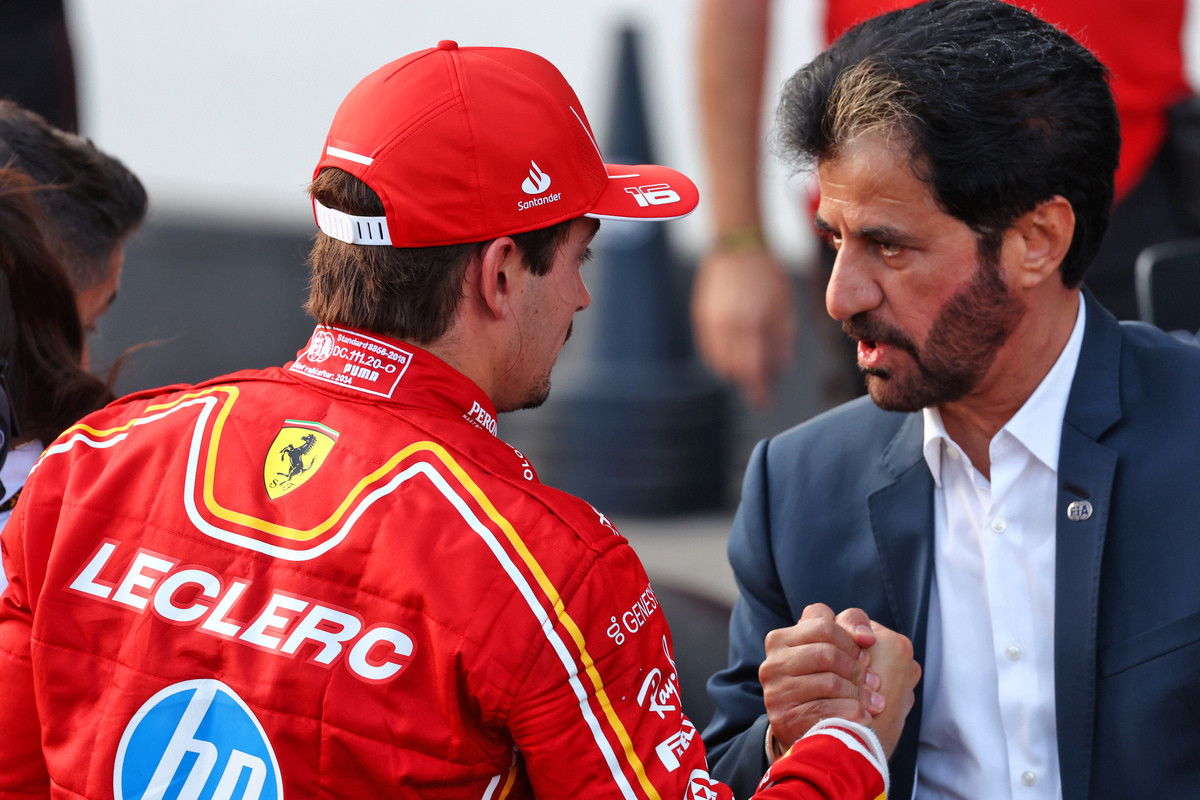

His comments come in the wake of increased attention on vulgar language amid a broader focus on misconduct.
Last month, the FIA published the 2025 International Sporting Code, a critical document in the smooth operation of motorsport globally.
Included was a new appendix, Appendix B: Stewards Penalty Guidelines.
The one-page document outlined a table of suggested penalties for five separate breaches of the International Sporting Code.
All five articles broadly centred on misconduct and covered specifics such as abuse, inciting violence or hatred, making political or religious statements, and failing to comply with instructions during official ceremonies.
None of those are new, though Appendix B has placed them under an especially bright light.
While much has been made of the addition to the ISC, which includes suggested financial penalties and even bans, neither the FIA nor the stewards have any additional power or authority to impose harsher penalties that were already laid out within it.
However, it did create an important discussion point as the ISC’s (perhaps intentionally) vague wording, not to mention the accompanying appendix, left it open for interpretation.
And while the motives for that can be debated, the inescapable fact is the spotlight has been shone on an area of the regulations that has been largely ignored.
While a harder line against swearing in official media sessions makes sense, it is the potential for penalties as a result of comments over team radio that have triggered the latest wave of consternation.
The radio serves two main functions: there is the basic communication aspect but also a critical safety element that cannot be ignored.
Radio conversations between driver and team are ostensibly a private means of communication.
For the television audience, it is the chatter between the driver and the pit wall that offers the most intrigue and has been used by the television broadcast to paint a broader picture of events.
It can tell a story of frustration, jubilation, confusion, or even offer a glimpse into future events through strategy.
All teams have their feeds monitored with the best snippets finding their way onto the broadcast.
Behind the scenes, Formula 1 has a team of people monitoring radio for entertainment value and any content (language) issues, which can be ‘hashed’ out if displayed on screen, or beeped out if the audio is played.
Once a snippet is identified, it is put forward to the broadcast editor who can then make a call on whether it is beamed into our living rooms.
There is an inherent delay in that process, which nullifies any real sporting advantage teams may derive from it but also affords time for the content to be appropriately curated for broadcast.
However, there are instances where keywords are missed or channels that are not being monitored where drivers and teams can come unstuck.
Yuki Tsunoda was caught out at the Austrian Grand Prix for comments he made about the Sauber team while sitting in pit lane.
The Japanese driver, speaking in English, used a derogatory term for which he was heavily fined.
It was an honest mistake from a driver who didn’t learn English in a formal classroom session but in the paddocks of the world’s racetracks.
His comments reflected the state of the sport, as unsavoury, awkward, and embarrassing as they may be.
Tsunoda’s remarks were not fit for broadcast, but they were anyway and officials duly penalised him regardless of the mitigating circumstances.
Was that the right course of action from the FIA, and was F1 right in allowing that audio to air (though it should be noted, not as part of the main feed).
It is precisely that point FIA president Mohammed Ben Sulayem pondered in a recent interview with SoyMotor.
“Do we go on and then shut down the radios of live communications? Maybe. Do we delay it? Maybe,” he said.
“There’s a lot of things we will work [on] with our promoters. We are still the owners of the championship.”
Those comments have been twisted to mean the FIA boss wants to ban the use of team radio on television broadcasts.
It would be a fast resolution to the problem at hand, but one that comes at a cost to the viewing public at a time when F1 is working to make itself accessible, relatable, and appealing to a new audience.
Furthermore, Speedcafe understands that the FIA has no authority to make such a decision.
The television broadcast is owned and operated by Formula 1, which produces a ‘world feed’ it then provides to networks globally; why the commentators may be different from one market to the next, the underlying imagery and audio tracks are supplied.
That is not to say F1 is ambivalent to the problem and sources there have stated unequivocally to Speedcafe that drivers are role models and should behave as much.
Though radio from race control is no longer broadcast, teams do not have the opportunity to opt-out.
But by the same token, they are competitors and humans and will have emotions commensurate with their fortunes – many of which they’ll express over the radio – which deserve to be treated sympathetically.
It’s not in F1’s best interest to broadcast vulgarity as it is working to appeal to all ages.
The intent of the FIA’s renewed stance on misconduct is not necessarily to clamp down on swearing but to stamp out abuse more broadly and specifically wield a heavy hand when it is directed towards officials.
Last week, the FIA published the results of a survey conducted among other sporting governing bodies under its United Against Online Abuse banner.
That revealed young athletes and officials are increasingly likely to be turned away from their chosen sport because of the online vitriol they are exposed to.
The intent of Appendix B is an attempt to have motorsport and its participants accept their responsibility as role models in an effort to stamp out the dumpster fire some social media platforms have become.
Swearing over team radio is but one element of that, and one that is arguably gaining far more attention than is warranted.
Team radio is a private communication channel that we are fortunate to have the ability to listen to. It is not designed for us, nor is it intended for us.
And that raises the bigger issue: is this really an issue the drivers and teams should be trivialising themselves with, or is this a matter the FIA and F1 should take behind closed doors and find a middle ground on?
Perhaps that’s the point the FIA president was making: the way team radio is used needs to be tightened up more so than what is said over it.
Taking that stance leads one down a regulatory road, a realm usually the domain of the FIA.
The problem is, it’s subjective: what offends you may not offend me.
So, ultimately, who is responsible for deciding what is and is not appropriate for broadcast? Is it F1 as the broadcaster, or the FIA as the regulator?




















Discussion about this post